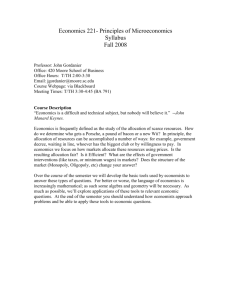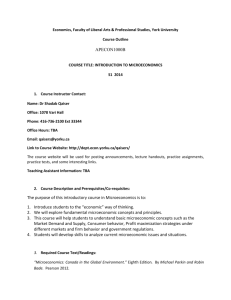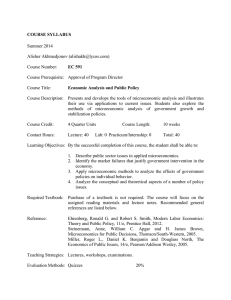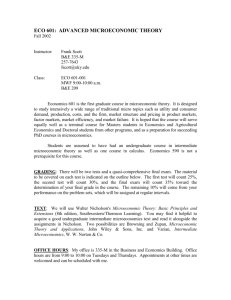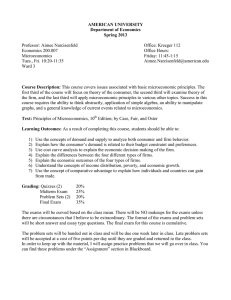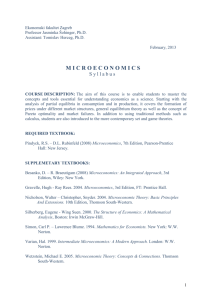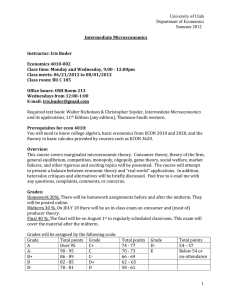UNIVERSITY OF WYOMING COLLEGE OF BUSINESS DEPARTMENT OF ECONOMICS AND FINANCE
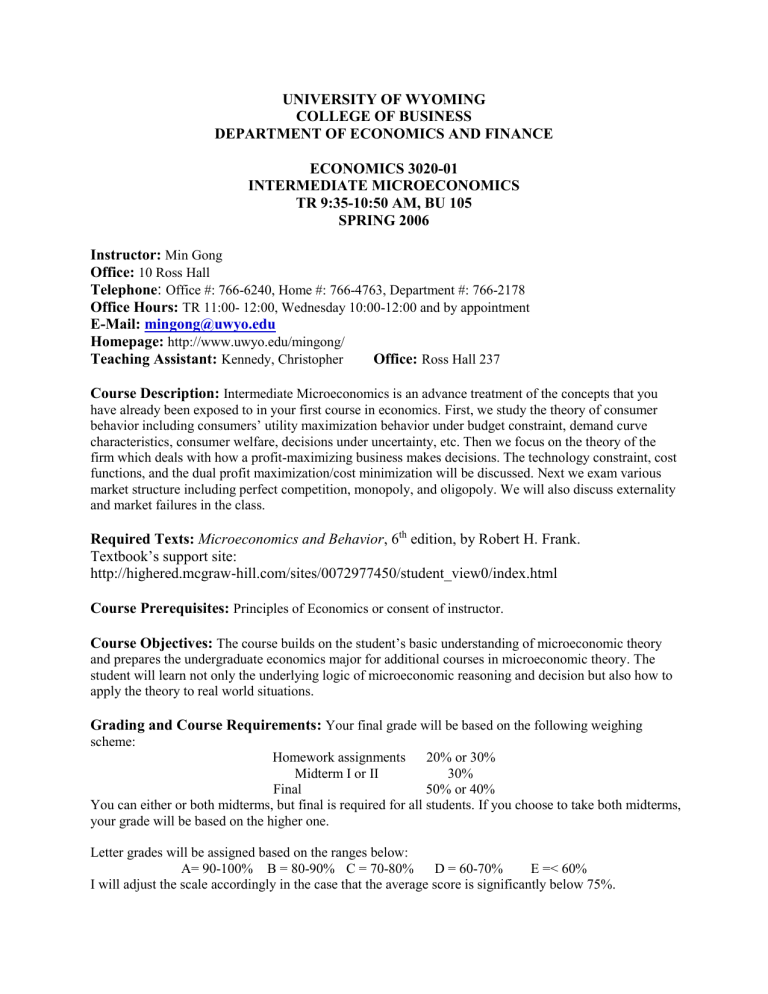
UNIVERSITY OF WYOMING
COLLEGE OF BUSINESS
DEPARTMENT OF ECONOMICS AND FINANCE
ECONOMICS 3020-01
INTERMEDIATE MICROECONOMICS
TR 9:35-10:50 AM, BU 105
SPRING 2006
Instructor: Min Gong
Office: 10 Ross Hall
Telephone : Office #: 766-6240, Home #: 766-4763, Department #: 766-2178
Office Hours: TR 11:00- 12:00, Wednesday 10:00-12:00 and by appointment
E-Mail: mingong@uwyo.edu
Homepage: http://www.uwyo.edu/mingong/
Teaching Assistant: Kennedy, Christopher Office: Ross Hall 237
Course Description: Intermediate Microeconomics is an advance treatment of the concepts that you have already been exposed to in your first course in economics. First, we study the theory of consumer behavior including consumers’ utility maximization behavior under budget constraint, demand curve characteristics, consumer welfare, decisions under uncertainty, etc. Then we focus on the theory of the firm which deals with how a profit-maximizing business makes decisions. The technology constraint, cost functions, and the dual profit maximization/cost minimization will be discussed. Next we exam various market structure including perfect competition, monopoly, and oligopoly. We will also discuss externality and market failures in the class.
Required Texts: Microeconomics and Behavior , 6 th
edition, by Robert H. Frank.
Textbook’s support site: http://highered.mcgraw-hill.com/sites/0072977450/student_view0/index.html
Course Prerequisites: Principles of Economics or consent of instructor.
Course Objectives: The course builds on the student’s basic understanding of microeconomic theory and prepares the undergraduate economics major for additional courses in microeconomic theory. The student will learn not only the underlying logic of microeconomic reasoning and decision but also how to apply the theory to real world situations.
Grading and Course Requirements: Your final grade will be based on the following weighing scheme:
Homework assignments 20% or 30%
Midterm I or II 30%
Final 50% or 40%
You can either or both midterms, but final is required for all students. If you choose to take both midterms, your grade will be based on the higher one.
Letter grades will be assigned based on the ranges below:
A= 90-100% B = 80-90% C = 70-80% D = 60-70% E =< 60%
I will adjust the scale accordingly in the case that the average score is significantly below 75%.
Attendance Policy: Attendance is encouraged but not required. No late homework is accepted and no make up tests will be given.
Academic Dishonesty
: Also known as “cheating,” academic dishonesty will not be tolerated in this class. Cases of academic dishonesty will be prosecuted in accordance with UNIREG 802
Rev. 2. Cheating in this course can result in an “F” in the course. In this course, academic dishonesty includes (but is not limited to) unapproved assistance on examinations, copying the homework of others, plagiarism or other use of published materials without complete citations, or fabrication of referenced information.
Group Work Guidelines : You are encouraged to discuss your work with your peers, but the assignments and the exam must be individually thought-out and written.
Disclaimer: The syllabus is subject to revision. If there is any change, I will let you know in class.
Course Outline
Part I. Review
1.1
Math Review
1.2
Principles of Microeconomics Review
Homework assignment I
Reading assignments: Chapter 1 & 2.
Part II. Consumer Theory
2.1 Budget Constraint (Chapter 3)
2.2 Consumer preference and the Best Feasible Bundle (Chapter 3)
2.3 Deriving individual demand curve (Chapter 4)
Homework assignment II
2.4 Income and Substitute Effects (Chapter 4)
2.5 Price Elasticity (Chapter 4)
2.6 Market Demand Curve (Chapter 4)
2.7 Consumer Surplus (Chapter 5)
Homework assignment III
2.8 Other Applications of the Consumer Theory* (Chapter 5)
Midterm I
Part III Theory of the Firm
3.1 Isoquants and Production Functions (Chapter 9)
3.2 Returns to Scale (Chapter 9)
3.3 Cost Curves (Chapter 10)
Homework assignment IV
3.3 Economies of Scope and Subadditivity (Chapter 10)*
Part IV Market Structures
4.1 Perfect Competition (Chapter 11)
4.2 Monopoly (Chapter 12)
Midterm II
Part V Special Topics
5.1 Introduction of Game Theory (Chapter 13)
5.2 Imperfect Competition (Chapter 13)
Homework assignment V
5.3 Decisions under Uncertainty (Chapter 6)*
5.4 General Equilibrium and Market Efficiency (Chapter 16)*
5.5 Public Good and Market Failure (Chapter 17) *
5.6 Factor Market (Chapter 14 & 15) *
Final
*
Time Permitting
